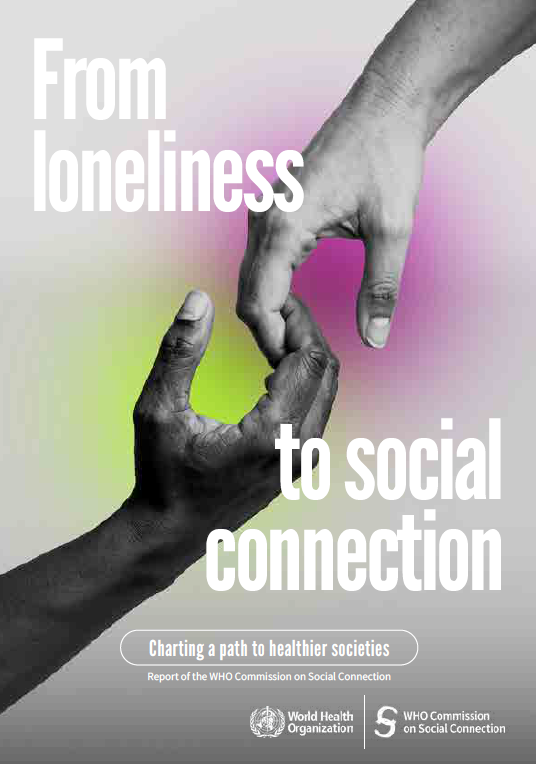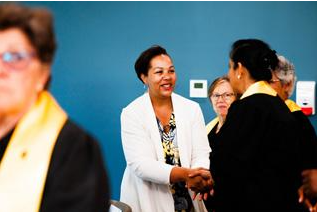International Day of Older Persons Social Prescribing Storytelling
About this Campaign
This article is one in a series, along with stories shared by several of our partners, as part of a special social prescribing storytelling campaign commemorating the International Day of Older Persons and National Seniors Day in Canada, on October 1. It symbolizes a collaborative effort among early adopters and leaders of social prescribing in Canada, aimed at elevating the prominence of the initiative. This campaign seeks to articulate the profound impact of social prescribing in enhancing the lives of older adults contending with feelings of loneliness and isolation.
Calling for Connection
The Canadian Red Cross Friendly Calls program offers a social prescription for alleviating loneliness and improving emotional well-being.
Like countless older adults in Canada, Shelly could benefit from more social interaction. While she has no children of her own, the 54-year-old Prince Edward Island resident often cared for children of family and friends throughout her life, finding purpose and joy in those experiences. In recent years, Shelly has found herself with fewer people to connect with.
Over time, increasing anxiety caused by being in public spaces and around large groups of people has further isolated Shelly. “It is very hard to get out and do things because of my anxiety,” she shares. “Living alone can be very lonely at times.”
Shelly connected with different community services, but had difficulty finding consistent support. One day, a local organization gave her the phone number for the Canadian Red Cross Friendly Calls program. The initiative strengthens social connectedness and well-being by checking in with participants through regular phone calls and providing emotional support, encouraging healthy coping strategies, and sharing community resources.

Friendly Calls is available to anyone in Canada over the age of 18, with a focus on reaching older adults, Indigenous peoples, frontline workers, parents, caregivers, and anyone who might benefit from increased access to social interaction and support. The program aims to alleviate the significant impact social isolation has on both individual health and the health care system.
From October 2022 to June 2023, program personnel provided 43,617 Friendly Calls and 5,867 enhanced support calls across Canada. The program engages nearly 1,000 volunteers who provided more than 1.2 million minutes of Friendly Calls support during this time. More than 80 per cent of participants say they feel safer and less lonely thanks to the program.
After reaching out to Friendly Calls, Shelly was paired with a program advisor and things began to shift. “Shelly had been grappling with isolation and its detrimental effects on her mental health. Through regular Friendly Calls, she found not only comfort, but a renewed sense of community. These calls provided direly needed support, helping her navigate tough times with a stronger spirit,” says Myriam Chebat, a Friendly Calls Advisor with special training to help participants in need of enhanced support to strengthen their coping skills.
Friendly Calls enhanced support is available for participants with more complex needs and can include setting goals toward increasing pro-social behaviour, helping to recognize unhelpful thoughts, and managing emotions. The flexible and participant-led approach is grounded in active listening, validation, and empathy.
Shelly says she looks forward to her weekly call and appreciates it's something she can rely on. She feels safe speaking to her advisor, is learning how to work through her fears, and says that the program is helping her get out into her community more often. Since discovering Friendly Calls, Shelly has connected with her local church and has been practising mindfulness and breathing exercises.
Older adults, especially those with lower incomes or who live alone, are one of the most isolated groups in communities across Canada.

According to Canada’s National Institute on Aging, older adults are one of the most financially vulnerable populations, and the number of older adults who experience low income is increasing. With Canada’s senior population expected to grow by 68 per cent over the next 20 years, strengthening social supports, building community capacity, and integrating healthcare and social services will be critical factors in encouraging healthy aging.
Social prescribing initiatives allow healthcare providers and social service professionals to connect individuals with meaningful, non-medical supports and community resources, such as Friendly Calls, to improve their overall health. These initiatives address social and emotional well-being, as well as basic needs, such as income, housing, and food—a holistic approach aimed at cultivating a deeper sense of belonging.
“Witnessing the profound impact of Friendly Calls on participants like Shelly, I am inspired by its capacity to heal, uplift, and alleviate pressures on vital public services,” Myriam says. “The Friendly Calls program isn't just connecting individuals, it's weaving a safety net of resilience, making our communities stronger, healthier, and more closely knit.”
The Friendly Calls program demonstrates that hearing a familiar voice, knowing that someone is listening, and trusting that they are there to help, can have an immense impact on an individual’s well-being. A sense of belonging in community lifts people up and helps to foster purpose in their lives. It's a simple, yet remarkable, reminder of the power of social connection.
The Canadian Red Cross Friendly Calls program, funded through the Public Health Agency of Canada, is free and is available nationwide in English and French. Anyone can sign up by calling 1-833-979-9779 toll-free from 9 a.m. to 5 p.m. local time on weekdays, or by accessing the sign-up form online. Learn more about Friendly Calls, including volunteer opportunities, here.
The Canadian Institute for Social Prescribing (CISP) is an intersectoral collaboration initiative of the Canadian Red Cross. Visit the CISP website to learn more about social prescribing research, resources, and initiatives in Canada and internationally.
The Social Prescribing Movement is Growing
CISP is collaborating with United Way British Columbia, the Alliance for Healthier Communities, the Older Adult Centres’ Association of Ontario, and Healthy Aging Alberta to raise the profile of social prescribing in Canada through a series of initiatives, including this storytelling campaign.
Non-profit organizations work closely with the health care sector to develop and promote social prescribing initiatives that prioritize health equity, community leadership, and collaboration. Additional social prescribing resources from CISP and our partner agencies can be accessed below:
· Current State of Social Prescribing in Canada (CISP)
· Social Prescribing Pathway (CISP)
· Good Health & Wellbeing- Social Prescribing: Global Social Prescribing Alliance Playbook (CISP)
· Social Prescribing Online Training Course (OpenWHO)
· A toolkit on how to implement social prescribing (WHO)
· Links2Wellbeing: Social Prescribing for Older Adults (OACAO)
· Connecting health and social care systems with Social Prescribing (Red Cross)
· Responding to the Social Determinants of Health and an Epidemic of Social Isolation (Alliance)
· Social Prescribing: a Resource for Health Professionals (CEP, CISP, Alliance)New Paragraph







